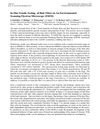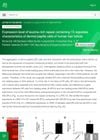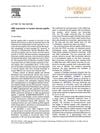 March 2019 in “European archives of medical research”
March 2019 in “European archives of medical research” Platelet-rich plasma injections are a cheap and effective way to reduce hair loss and improve hair quality in people with mild to moderate androgenetic alopecia.
 3 citations,
January 2021 in “Journal of The American Academy of Dermatology”
3 citations,
January 2021 in “Journal of The American Academy of Dermatology” Different types of atopic dermatitis were linked to specific genetic and immune changes, suggesting that severe cases might need stronger immune-targeting treatments.
 9 citations,
February 2019 in “Journal of Clinical Research in Pediatric Endocrinology”
9 citations,
February 2019 in “Journal of Clinical Research in Pediatric Endocrinology” Children with classic congenital adrenal hyperplasia have thicker heart fat and are at higher risk for heart problems and early atherosclerosis.
 January 2023 in “Research Square (Research Square)”
January 2023 in “Research Square (Research Square)” Hair cortisol may be a good indicator of recent mood in people with bipolar disorder.
 May 2023 in “The journal of investigative dermatology/Journal of investigative dermatology”
May 2023 in “The journal of investigative dermatology/Journal of investigative dermatology” A potential treatment for atopic dermatitis could be to increase PADI1 expression to improve skin barrier function.
 December 2022 in “bioRxiv (Cold Spring Harbor Laboratory)”
December 2022 in “bioRxiv (Cold Spring Harbor Laboratory)” MicroRNA-205 helps hair grow by changing the stiffness and contraction of hair follicle cells.

Combining epinephrine with a steroid may help regrow hair in severe alopecia areata cases.
 August 2007 in “Microscopy and Microanalysis”
August 2007 in “Microscopy and Microanalysis” Hair fibers break by cuticle cell slipping, shape changing, cuticle fraying, and surface cracking when stretched under specific conditions.
 1 citations,
September 2020 in “Journal of Dermatological Science”
1 citations,
September 2020 in “Journal of Dermatological Science” The gene LRRC15 is more active in balding areas of the scalp compared to non-balding areas.
 50 citations,
March 2017 in “PeerJ”
50 citations,
March 2017 in “PeerJ” Using finasteride or dutasteride may cause long-lasting erectile dysfunction.
 9 citations,
November 2011 in “Cytokine”
9 citations,
November 2011 in “Cytokine” Finasteride helps reduce lung inflammation and damage after trauma and infection.
6 citations,
February 2021 in “Frontiers in Neurology” Cyclosporine-A can cause serious blood clots in the brain, so patients need careful monitoring.
 7 citations,
July 2005 in “Journal of Dermatological Science”
7 citations,
July 2005 in “Journal of Dermatological Science” The gene URB is more active in human hair growth cells and responds to a hair-related hormone.
 46 citations,
April 2008 in “Archives of Dermatological Research”
46 citations,
April 2008 in “Archives of Dermatological Research” Substance P may worsen acne by increasing inflammation, but corticosteroids might help by reducing this effect.
 5 citations,
April 2022 in “Frontiers in Medicine”
5 citations,
April 2022 in “Frontiers in Medicine” Hair and skin healing involve complex cell interactions controlled by specific molecules and pathways, and hair follicle cells can help repair skin wounds.
 November 2023 in “Dermatologica sinica/Zhōnghuá pífūkē yīxué zázhì”
November 2023 in “Dermatologica sinica/Zhōnghuá pífūkē yīxué zázhì” Upadacitinib helped regrow hair in a severe alopecia areata patient but stopping treatment caused hair loss to return.
 116 citations,
December 2017 in “International Journal of Women's Dermatology”
116 citations,
December 2017 in “International Journal of Women's Dermatology” Adult female acne treatment should be personalized, considering individual preferences and pregnancy, using various topical and oral medications while managing side effects and resistance.
 6 citations,
July 2015 in “European Journal of Dermatology”
6 citations,
July 2015 in “European Journal of Dermatology” Stopping methotrexate might reverse lymphoma-like conditions in some patients.
 6 citations,
July 2015 in “Journal of Investigative Dermatology”
6 citations,
July 2015 in “Journal of Investigative Dermatology” Chicken feather gene mutation helps understand human hair disorders.
 17 citations,
March 2018 in “Pediatric dermatology”
17 citations,
March 2018 in “Pediatric dermatology” Hydroxychloroquine may help treat alopecia areata in children.
 2 citations,
April 2019 in “Dermatologic Therapy”
2 citations,
April 2019 in “Dermatologic Therapy” A patient with alopecia had hair regrowth with tofacitinib but developed a skin reaction, choosing to continue the treatment despite the side effect.
30 citations,
November 2020 in “Journal of Advanced Research” Conditioned medium from keratinocytes can improve hair growth potential in cultured dermal papilla cells.
1 citations,
January 2023 in “Science Advances” The skin's microbiome helps hair regrow by boosting certain cell signals and metabolism.
 11 citations,
August 2014 in “Current Urology Reports”
11 citations,
August 2014 in “Current Urology Reports” Medications for enlarged prostate can cause sexual side effects like reduced libido, erectile dysfunction, and ejaculatory problems.
 28 citations,
February 2010 in “British journal of dermatology/British journal of dermatology, Supplement”
28 citations,
February 2010 in “British journal of dermatology/British journal of dermatology, Supplement” WNT10A mutations cause varied symptoms in patients with odonto-onycho-dermal dysplasia.
 8 citations,
February 2010 in “Journal of Dermatology”
8 citations,
February 2010 in “Journal of Dermatology” A topical treatment safely and effectively reduced acne by causing targeted cell death in sebaceous glands without side effects.
 October 2023 in “Bioactive Materials”
October 2023 in “Bioactive Materials” The new hair loss treatment combining nitric oxide and minoxidil in a special carrier is effective for hair regrowth.
 February 2022 in “Global academic journal of medical sciences”
February 2022 in “Global academic journal of medical sciences” People with alopecia areata have much lower Vitamin-D levels than healthy individuals.
 3 citations,
May 2019 in “Cytotherapy”
3 citations,
May 2019 in “Cytotherapy” ATIR101 improves survival in stem cell transplant patients; Australian stem cell treatment decisions are influenced by regulation changes.
 September 2023 in “bioRxiv (Cold Spring Harbor Laboratory)”
September 2023 in “bioRxiv (Cold Spring Harbor Laboratory)” Freezing gamma-irradiated amniotic fluid may help hair growth and speed up the growth phase.


























